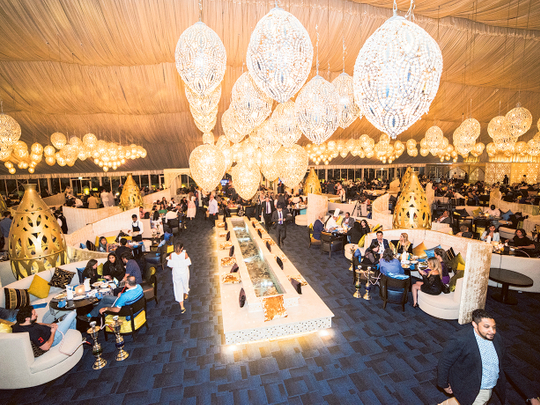
Dubai: The growing trend of lavish Dubai tents during Ramadan is here to stay.
Despite most families have their own Ramadan traditions — from cultural dishes to family gatherings and group prayers at the mosque — the trend of tents has slowly become a part of the Ramadan culture.
This Ramadan, residents’ favourite tents in Dubai are back with a new makeover — more delicious dishes, traditional desserts and a higher capacity for guests.
Reporting a growing number of people visiting Ramadan tents for iftar and suhour over the past few years, several tents said they have expanded their guest capacity for this year.
However, the concept of going to a tent stylishly dressed up, to meet friends and family for a lavish dinner and a session of shisha during the holy month has evoked split views.
Being the one month in the year that is solely dedicated to worship and self-reflection, Ramadan is a time where Muslims are encouraged to be pious.
While the debate continues, there is no denying that the number of Ramadan tents is growing.
No food wastage
One of the most popular tents in Dubai, the Asateer Tent, is back this year with a capacity of 1,000 guests.
Offering around 300 dishes including appetisers, main courses and desserts every night, the tent has increased its seating capacity to accommodate more people, said Dima Ayad, vice-president of food and beverage and marketing at Atlantis.
“Tents have become a part of the Ramadan culture. What often happens during Ramadan is that many people are living away from their families, and they unite with friends and loved ones at tents where they feel homely and tranquil and can enjoy a meal together. They build bonds and can have conversations without worrying about loud music,” explained Ayad.
Offering traditional dishes and Ramadan favourites, the Asateer Tent is charging its guests Dh205 for iftar and a minimum spent of Dh175 for suhour. “We find that many guests return to the tent several times during the month with different crowds, from family and friends to work colleagues and business associates,” said Ayad.
When it comes to the amount of food prepared each night, Ayad said small portions of each dish is replenished throughout the night in order to avoid food wastage.
Just the same, Sebastien Braun, F&B manager, Dubai Creek Golf & Yacht Club, said food at the QD’s Ramadan tent is prepared according to the bookings made each night, with an additional 20 per cent to cover the last-minute bookings and walk-ins. When it comes to excess food, he explained that the club started composting all staff cafeteria food waste on-site in February. “This includes meat, bones, fruit, vegetable peelings, plate scrapings, spoilt food, wasted food from plates, trimmings. The team is utilising all discarded and unused food to feed back into enriching the beautiful gardens, lawns, plants and trees. This fantastic initiative has been implemented in all restaurants on-site, and the same concept of composting will be implemented at QD’s Ramadan Tent,” he said.
Charging their guests Dh160 per adult, and Dh65 per child each for either iftar or suhour, the QD tent has also increased its capacity to meet the demand. “The tent can accommodate 350 people. We increased covers by 30 per cent between 2012 and 2014 as the size of the tent was increased in order to cater to more demand. Comparing the number of covers between 2014 and 2015, the increase was 10 per cent,” explained Braun.
Ehab Ma’lem, general manager at Al Baddad Capital that specialises in providing different types of tents, said, “The demand for Ramadan tent events is extremely high.” Compared to last Ramadan, Ma’lem said: “There is an increase in the demand by almost 40 per cent, and most of the clients are private companies such as hotels, and event companies.”
Inflated prices of food concern some resident
Taking one side of the debate, Nancy Awad, 30, from Egypt said her main concern with Ramadan tents is the high prices charged in comparison with the small amount of food consumed by each guest.
“The prices charged seem to increase every year, and the amount of food a person can eat at iftar is the same on average and doesn’t really change. While it’s nice to go out with friends and family during Ramadan, the growing trend of tents has become a major distraction for lots of people who spend their time experiencing new places every day, instead of making sure they are carrying out their religious obligations,” she explained.
“I don’t encourage lavish Ramadan tents but I don’t mind them. It only becomes undesirable in Ramadan when it turns into an ongoing fest from maghrib to sohour,” he said.
Referring to the large non-Muslim expatriate population in the UAE, Al Bassam said he highly discourages lengthy Ramadan tents, as they send the wrong message to those observing Ramadan. “Ramadan tents should be for breakfast and should be brief. I would be extremely disappointed if the practice of Ramadan tents prevails and becomes part of Ramadan traditions,” he added.
Rising demand
Ehab Ma’lem, general manager at Al Baddad Capital that specialises in providing different types of tents, said, “The demand for Ramadan tent events is extremely high.” Compared to last Ramadan, Ma’lem said: “There is an increase in the demand by almost 40 per cent, and most of the clients are private companies such as hotels and event companies.”
(With inputs from Omnia Fahim, Special to Gulf News. Omnia Fahim is an intern with Gulf News)








